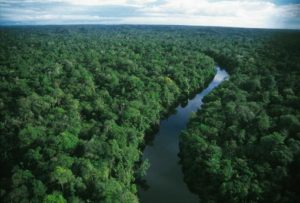Indigenous organisations from nine Amazonian countries launched on Saturday, October 26, 2024, at COP16 (UN Convention on Biodiversity) in Cali, Colombia, an unprecedented alliance in defence of the Amazon, traditional peoples, biodiversity and the global climate.

The Indigenous Amazon G9 will function as a coalition to coordinate actions and strengthen the common demands of Indigenous peoples from all countries where the largest tropical forest in the world is located.
The following organisations are part of this new political space:
- Confederación de Naciones y Pueblos Indígenas del Chaco Oriente y Amazonía de Bolivia (CIDOB, from Bolivia)
- Coordination of Indigenous Organisations of the Brazilian Amazon (COIAB, from Brazil) Organización Nacional de los Pueblos Indígenas de la Amazonía Colombiana (OPIAC, from Colombia)
- Confederación de Nacionalidades Indígenas de la Amazonía Ecuatoriana (CON FENIAE, from Ecuador)
- Asociación de Pueblos Ameríndios de Guyana (APA, Guyana)
- Federación de Organizaciones Amerindias de Guyana Française (FOAG, from French Guiana)
- Asociación Interétnica de Desarrollo de la Selva Peruana (AIDESEP, from Peru)
- Organización de los Pueblos Indígenas de Surinam (OIS, from Suriname)
- Organización Regional de Pueblos Indígenas de Amazonas (ORPIA, Venezuela)
As it is an alliance with a horizontal structure, and not an organisation, the G9 will not initially have steering groups, headquarters or processes for choosing leaders. All participating organisations will have equal weight in decision-making, which will be made by consensus.
Moral authority
The first demand of the Pan-Amazonian Peoples is that governments around the world recognise that traditional peoples are the main moral authorities when it comes to conserving biomes, protecting species diversity, and regulating the climate.
This moral authority is based on the fact that governments have repeatedly failed to increase their commitments to address the climate and biodiversity crisis’s gravity and fulfil their promises. In contrast, Indigenous peoples have always acted to protect nature and have been the best territorial managers on the planet, even without adequate funding for their actions and despite the insufficient space for participation they have in international negotiations.
Traditional knowledge and the dedication of Indigenous Peoples to protecting the environment have helped to curb the expansion of fossil fuels and the loss of vegetation and species, essential measures to limit the climate crisis. Scientific research has already shown that Indigenous Peoples play a particularly important role in the Amazon, where their territories act as barriers to environmental destruction.
Largely thanks to Indigenous Peoples, around 80% of the Amazon rainforest, one of the largest carbon sinks on a global scale and one of the planet’s most biodiverse areas, remains preserved. Despite “holding up the sky” for all humanity, as Indigenous thinkers have noted, Amazonian peoples continue to suffer persecution and attempts to erase their presence.
They are also among the communities most vulnerable to the climate crisis, as extreme droughts and abnormal temperatures reduce the volume of their rivers, hinder fishing and hunting, and make it difficult to maintain their traditional culture.
Priority Themes
By strengthening the common demands of Indigenous Peoples in the Pan-Amazon region, participating organisations hope to increase pressure on their governments to take action to guarantee the rights of these peoples and preserve their territories.
The main areas of work of the G9 will include:
- Biodiversity Conservation: Ensure that global policies and decisions respect the territorial rights of Indigenous Peoples and recognise their role in conserving biodiversity.
- Territorial Rights: Support the legal security of Indigenous territories through titling, demarcation and legal mechanisms to protect the collective ownership of Indigenous Peoples over their territories.
- Direct Financing: Demand direct financing mechanisms for Indigenous Peoples in the Amazon region, enabling them to manage their resources and conservation and sustainable development projects autonomously, in accordance with their knowledge and governance systems.
- Protection of Indigenous Peoples in Isolation and Initial Contact: Work to ensure that States respect the principle of “no contact”, ensuring the effective protection of the rights of these peoples and the ecosystems they protect.
- Unity of the Amazon Indigenous movement: Offer a space for articulation that expands the power of Indigenous Peoples to influence international negotiations, with a focus on defending territorial rights, conserving biodiversity and combating climate change.
